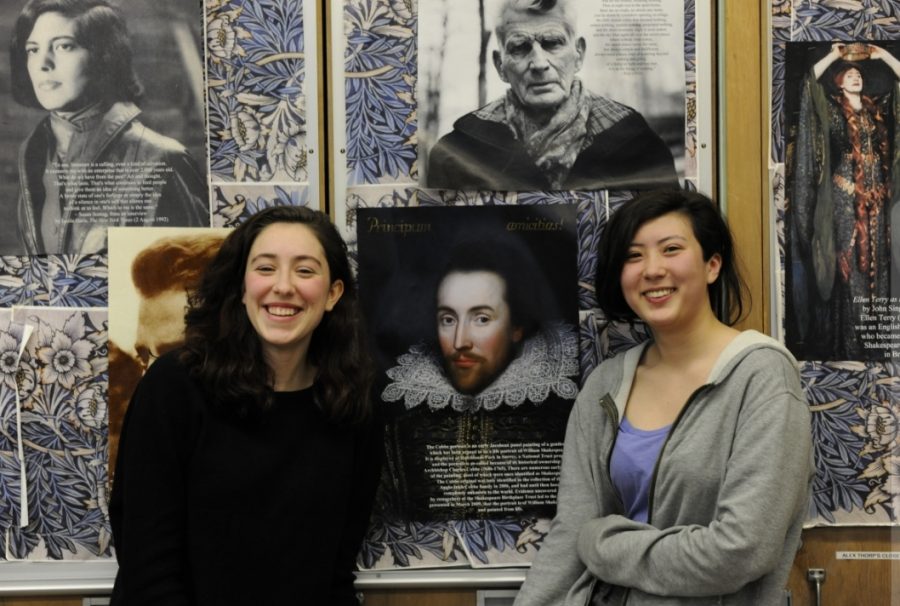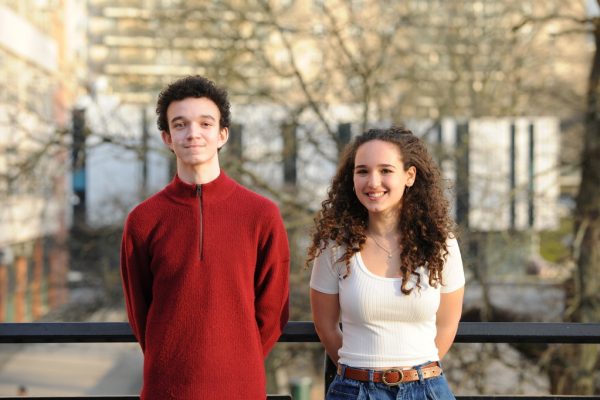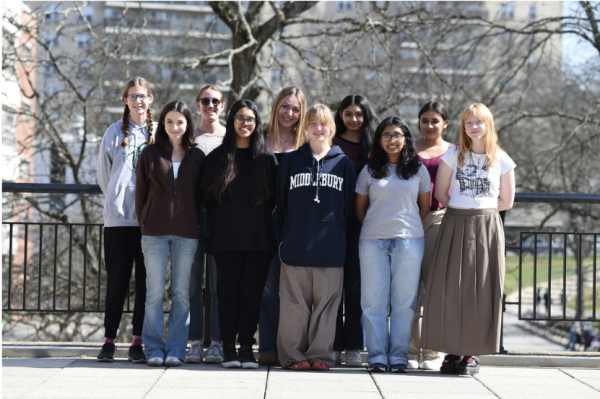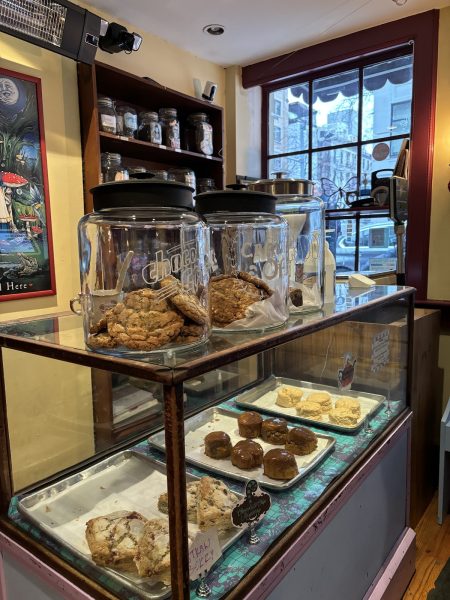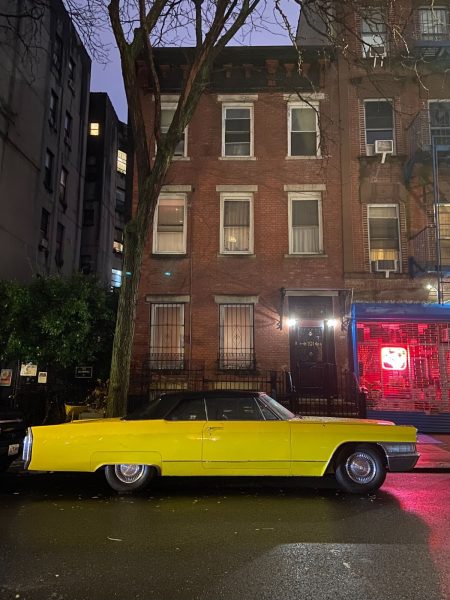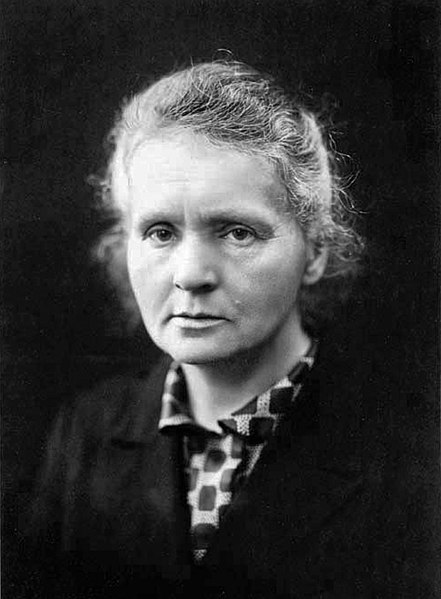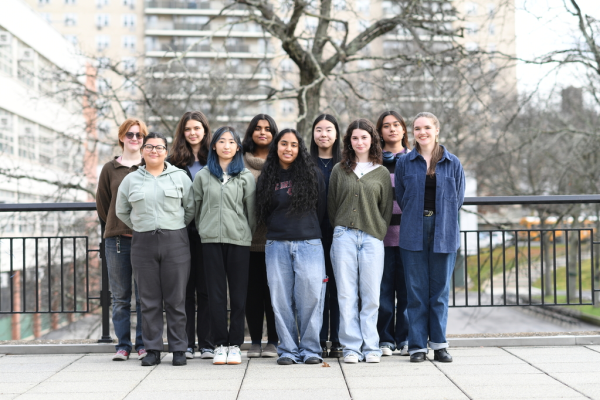Speak the Speech
Ava Vercesi ’19 (winner, on left) and Jing-Mae Wang ’20 (runner up, on right), stand in front of a print of the newly discovered Cobbe portrait of William Shakespeare
Having taken at least eight years of English classes, many Bronx Science students have familiarized themselves with the seventeenth century playwright, William Shakespeare. To pay respects to this famous writer, The English-Speaking Union, a non-profit educational charity, has held annual Shakespeare competitions since the year 1920. The first level of the thirty-fifth Annual Shakespeare Competition was held in the English wing with about thirty participants.
The objective of the event was not to simply find a student who recited lines well, but to find a student who demonstrated dramatic command and skill with their monologue or sonnet. The competition was judged by Mr. Alexander Thorp, Mr. Robert Brown, and Mr. Joseph Gazzola, all of whom have extensive backgrounds in theater and speech and debate judging.
“It is painful, and I wanted to explore that side of my acting.”
Compared to reading a science fiction novel in school, reading Shakespeare’s plays are the equivalent of seeing and hearing the events of that time through his eyes. Written dramas can reveal common issues that people have encountered, as well as larger problems politically, economically, or socially specific to certain eras and regions. Rather than watching an actor on stage, it can be even more exciting to channel a character and act in a scene. This year’s winner, Ava Vercesi ’19, participated with Tamora’s monologue from ‘Titus Andronicus.’ “I was so touched by it. It is painful, and I wanted to explore that side of my acting,” said Vercesi.
Other participants found this competition interesting because of the thrill of the performance. “The friends I made through the drama department really pressed me to participate, so I reluctantly agreed. However, once I picked out a monologue and began to build my character, I started to have a lot of fun with it,” said Jing-Mae Wang ’20, this year’s runner up.
Sometimes activities can appear boring and uninteresting until students see how enjoyable it can be when they try something new. “I like to act because it allows me to express different parts of the human experience in different ways. Every character ever created has a little piece of the author in them, and it is amazing to become someone else, even for a little while,” said Vercesi. One of the clubs at Bronx Science, the Actor’s Workshop Club led by Vercesi, helps individuals to build on the skill set and techniques one knows in order to give a captivating performance.
Besides the language used, which sounds different and foreign to some, the scenes capture a range of emotions and force the student to become a new person. Wang paid careful attention to details, brushing her knees as she stood up like her character would have, having kneeled by her late husband’s side. Others like August Pabua ’18 chose to participate due to Shakespeare’s unique poetry. “I like the old words,” said Padua.
Some performances by the students were powerful in how the lines were presented, but what may have set Vercesi and Wang apart from the rest was their body language, embodying the scene with the entirety of their body. In their respective performances, Vercesi fell to her knees moments after she began, and Wang began positioned on the floor, hugging her knees. Wang had performed Act Three, Scene Two, lines 106-125 of ‘Romeo and Juliet,’ reenacting Romeo’s death scene as she (Juliet) cries by his side. Similar to the performances of other finalists, Wang had to not only imagine the other characters but also the motivations behind the character. Since the speeches are monologues, all actors need to visualize what does not actually exist.
Participants must understand and essentially feel the emotions of the character in the context of the story. “I usually translate the monologue into normal English so that I can figure out the emotions that I convey…and then work at conveying the same kind of emotions in Shakespearean English and putting emphasis in similar areas. There’s a lot of figuring out where to move, what you should be doing with your hands, what your facial expression should be at what time – a lot of small details that have to be thought through and practiced,” said Gabrielle Sevillano ’18, runner up of the thirty-third Annual Shakespeare Competition.
After winning finals at Bronx Science, Vercesi moved on to participate in the City Semi-Finals on March 1, 2018 at the main branch of The English Speaking Union. Although she did not win the competition, Vercesi made it to semifinals, having delivered a “short and sweet” act to represent the artistic side of Bronx Science.
Tiffany Chen is the Managing Editor/Advisory Editor for ‘The Science Survey’ and a Groups Section Staff Reporter for ‘The Observatory.’ Her role...

